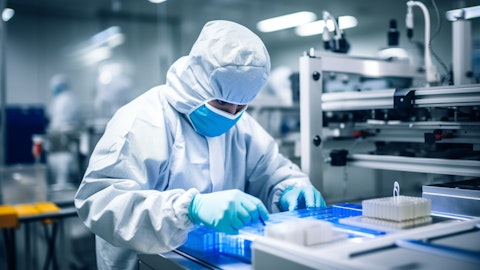AEye, Inc. (NASDAQ:LIDR) Q3 2024 Earnings Call Transcript November 12, 2024
Operator: Thank you for standing by. My name is Jeanine and I will be your conference operator for today. At this time I would like to welcome everyone to the AEye Q3 2024 Earnings Conference Call. All lines have been placed on mute to prevent any background noise. After today’s presentation, there will be an opportunity to ask questions. [Operator Instructions] I would now like to turn the conference over to Betsy Patterson [ph]. Please go ahead.
Unidentified Company Representative: Good afternoon and thank you for joining AEye’s third quarter 2024 earnings call. With me today are Matt Fisch, Chief Executive Officer; and Conor Tierney, Chief Financial Officer. Earlier today, AEye announced its financial results for the third quarter 2024. A copy of this press release can be found on the Investor Relations section of the company’s website. Today’s discussion may include forward-looking statements as defined in the securities laws and regulations of the United States with reference to future events, operating results, or performance and are based on our current expectations and assumptions. Any forward-looking statements are subject to inherent risks, uncertainties, and changes in circumstances.

Our actual results may differ materially from those contemplated by these forward-looking statements. You can find more information about the risks, uncertainties, and other factors in the reports AEye filed from time to time with the Securities and Exchange Commission, including in the most recent periodic report. The statements to be made are as of today only, and AEye does not intend to update any forward-looking statements regardless of any new information, future developments, or otherwise, except as may be required by law. In addition, we will be discussing non-GAAP financial measures on this call, which we believe are relevant in assessing the financial performance of the business. These measures are presented as supplemental information only and should not be considered as substitute for financial information presented in accordance with GAAP.
You can find reconciliations of these metrics to the most directly comparable GAAP measures within the press release. Now let me pass the call over to Matt.
Matt Fisch: Thanks, Betsy, and thank you all for joining us today on our third quarter 2024 earnings call. If there was an underlying theme for today’s call, it would be progress. Our team made significant strides this quarter in advancing product and partnership milestones and putting the financial tools in place to move us closer to our production goal. I’m very proud of the AEye team and the accomplishments we achieved in the quarter. On the product front, we announced that Apollo set a new bar in terms of performance with high resolution object detection at distances of 1 kilometer. We believe this accomplishment is the first among our peers. Even more remarkably, we delivered it in a form factor that is half the size of competing products.
Q&A Session
Follow Aeye Inc. (NASDAQ:LIDR)
Follow Aeye Inc. (NASDAQ:LIDR)
Receive real-time insider trading and news alerts
Our advanced technology coupled with superior design delivers what customers want. Apollo demonstrations have also driven a significant spike in customer interest across the board. I’m also pleased to announce that we have now delivered the first Apollo samples to our partners and thanks to Apollo’s SmartScan architecture, our partners are reaping the benefits of a software defined LiDAR solution where major configuration changes such as vehicle packaging, vehicle line variants and SKU options are delivered in days instead of weeks or months. This quarter we’ve also showcased Apollo by completing a major in-vehicle driving test with NVIDIA. Notably, we demonstrated that Apollo meets the NVIDIA Hyperion specifications, which demand an incredibly challenging combination of high resolution detection at very long distances.
We are not aware of any other LiDAR solution that has met this milestone. This is a significant step forward in what we expect will be the integration of our technology into the NVIDIA Hyperion platform. This achievement further validates the strength of our technology and paves the way for deeper integration with the NVIDIA ecosystem. Given its focus on high performance computing and AEye driven automotive solutions, NVIDIA is expected to have a profound influence on the autonomous and ADAS markets. We continue to deepen our relationship with our tier one partner LITEON. Together we are engaged in multiple global OEM quoting activities and expect to ramp the first Apollo manufacturing line later this quarter. We recently showcased Apollo together with LITEON at the IZB International Suppliers Fair in Wolfsburg, Germany.
IZB is held every two years and is one of the world’s leading tradeshows for automotive suppliers, attracting over 40,000 visitors from around the globe. I want to turn now to China, where we continue to make excellent progress with our partners ATI and LighTekton. ATI is currently demonstrating Apollo to potential customers. We’ve also been invited to demonstrate Apollo to multiple Chinese automotive OEMs in response to the Apollo launch at the LiDAR show in Suzhou in June. We view China as a leading indicator for the future of LiDAR and its eventual global adoption. The Chinese market is expected to ship 1 million LiDAR sensors this year and double that number in 2025, according to recent industry reports. Apollo has caught the attention of investors, which has enabled us to build the financial tools and liquidity to support the multi-year runway that’s required by the automotive production pipeline.
We believe that AEye continues to have the most efficient business model in the industry and our capital light approach has positioned us well to navigate the evolving LiDAR landscape. Our accomplishments this year are made even more impressive by the fact that we have done it with a remarkably lean team and overall structure. I could not be more proud of our highly talented team and look forward to continuing to work together to reach our goal of seeing AEye products transforming the automotive landscape. With that, I will turn the call over to Conor to provide more color on our financial performance.
Conor Tierney: Thanks, Matt. In the third quarter, we made solid progress across multiple fronts where we advanced product development, strengthened partner collaborations and expanded OEM engagements while maintaining disciplined cost management practices. Additionally, we took proactive funding measures that strengthened our liquidity to support the runway needed to continue to achieve key milestones. These accomplishments have prepared us to fully benefit from the opportunities evolving in our market. Most notably, we are in a stronger position to capitalize on the incredible global opportunities, which include China, where local OEMs are aggressively integrating LiDAR into their vehicles. We continue to have productive engagements with other OEMs and are encouraged to see them leaning in on adopting LiDAR technologies as potential solutions for autonomous driving and ADAS.
As you can see on Slide 8, our unique capital light model is a key differentiator in the LiDAR industry and is well received when we engage OEMs. Not only does it allow us to maintain a balance sheet with very little debt compared to some of our peers, it gives us the lowest cost structure in the industry. This leads to greater efficiencies as we can do more with less and is a powerful selling point as it enables us to offer a superior product at a competitive price point. As I mentioned earlier, the financial tools we’ve secured should provide us with the liquidity needed to continue developing our technology, bring Apollo to market and pursue multiple design wins. These tools include the ability to raise up to an additional $50 million through our equity line of credit facility and access up to $2.6 million of new capital through our aftermarket facility.
Additionally, we are always considering new investment opportunities with strategic partners. Now turning to our third quarter financial results on Slide 9. I am pleased to say that we have reduced our net cash burn for the sixth consecutive quarter. Excluding new financing, our cash burn for the third quarter was $5.6 million, down from $6.2 million in the second quarter, beating our guidance of $5.9 million. Total revenue was $104,000, which is in line with consensus expectations. Revenue was driven by non-automotive product sales to an existing customer. Gross margin was negatively impacted by the increased warranty reserves. Third quarter GAAP operating expenses were $7.6 million, down sequentially from $8.1 million in the second quarter of 2024 due primarily to payroll and facility related savings, which includes a non-cash adjustment associated with downsizing our office space partially offset by higher stock-based compensation expense.
Non GAAP operating expenses were $6.1 million, down sequentially from $6.4 million in the second quarter of 2024 due primarily to payroll and facility related savings. We reported a third quarter GAAP net loss of $8.7 million or $1.01 per share versus a GAAP net loss of $8 million or $1.16 per share in the second quarter of 2024. The increase in GAAP net loss was mainly due to financing related costs which were partially offset by payroll and facility related savings as noted above. On a non-GAAP basis, our net loss was $6 million or $0.70 per share in the third quarter compared to a non-GAAP net loss of $6.2 million or $0.91 per share in the second quarter of 2024. This was the 11th consecutive quarter of where AI has either met or beat bottom line expectations, which we believe demonstrates our ability to consistently execute.
Net cash used for operating activities decreased to $5.4 million in the third quarter from $6.4 million in the second quarter. We closed the third quarter with $22.4 million of cash, cash equivalents and marketable securities. Our potential liquidity which includes cash on hand, our ELOC and ATM facilities is approximately $75 million. Turning to 2024 guidance on Slide 10 our ongoing expense reduction initiatives are yielding tangible cash savings and we are still trending towards outperforming our 2024 cash burn guidance of $25 million through continued payroll and facility related savings. We are excited by the progress that we made in the third quarter on multiple fronts. And our team continues to execute our long term growth strategies.
AI has a recipe for success, a sustainable business model, the necessary capital raising tools in place and Apollo, the best product in the marketplace. We look forward to reporting on the progress we continue to make in 2024 and are excited for what we will accomplish in 2025 and beyond. With that, I’ll pass it back to Matt to wrap things up.
Matt Fisch: Thanks Conor. The third quarter reflected the strength of our achievements, strategic advancements and financial stability, as we continue to raise the bar on the product front. From surpassing our own internal product performance goals to the terrific progress coming from our partners, we are well positioned to drive sustained interest and engagement from OEMs. Our financial approach has enabled us to put the tools in place to pursue the next major milestones in our growth. Most importantly, our team remains committed, motivated and equipped with the expertise needed to secure our success. We’re energized by the momentum and opportunities ahead and we look forward to building value for our stakeholders. Thank you for your continued support.
Q – Brian Kinstlinger: Great, thanks. And congratulations on the progress with the high-resolution detection at a kilometer and with such a small form factor, it’s impressive. You’ve talked in the past about a pipeline of I believe, four to five RFQs where you were active. How have these potential end customers reacted to the advances both with NVIDIA as well as the high resolution at this long range? And what should investors expect as the next data points on some of these procurements?
Matt Fisch: Hey Brian. Hey, thanks. This is Matt and do thank you for joining the call this quarter. Let me take this in a couple of parts. Number one, as we know 2024 has been a quiet year on the nomination side for OEMs. And based on what we’re seeing, what we’re hearing, I think, we can start to see some sourcing decisions next year just based on what we’re hearing. So I think we’ll have a bit more action than we did in 2024. Taking it back to Apollo and our product, the response has been very, very positive. Those engagements that we talked about last quarter continue to be strong and as I mentioned, expecting to come to a head as we get into 2025 here. But look, here is the thing. One of the key challenges in integrating a new sensor into an ADAS system or an autonomy type system is really getting it all integrated into the software.
And just getting a little bit technical for a second all the software that’s out there today is used to digesting and consuming images of things, for example, that come from cameras. The thing that Apollo does is makes this interface a lot more seamless and reduces the friction on the OEM because the image, so to speak, coming out of our LiDAR system is very wide, it shows a wide field of view and it shows high resolution very far. And that makes it easier for the OEM software to digest our data relatively speaking. Of course, the size of the device is a bonus, but just look at it as lowering the friction to integrate our device from a software perspective, as we know is a bottleneck for many of those OEMs out there.
Brian Kinstlinger: Great, that was helpful. Can you talk about how you see, I mean, we heard the size and the range. Can you talk about, how were the competitive landscape for these RFQs that you’re facing this year?
Matt Fisch: So look, I’m assuming you’re somewhat familiar with the automotive industry, forgive me if you know on that one. But look, the automotive industry always leans toward having choices, right? And we simply want to be the best choice when it comes to performance, size and cost. And I think we’ve talked about performance and size. Cost is another key differentiator. And one of the main things that differentiates us from the others out there is that we are joined at the hip with a Tier 1 supplier who has already got tremendous expertise in optics, which is important for the LiDAR space. So they have the technical experience and they have the buying power. So this gives us, we believe, a very distinct cost advantage during the sourcing process, which is another key leg of the stool here.
And we’re feeling great about that LiDAR is a well-known force in not only the automotive, but the consumer market to help us be the most competitive in our market space from a cost perspective.
Brian Kinstlinger: Great. Now with the administration change and President Trump talking about increased tariffs on imported vehicles, potentially. Does this in any way change your plan or your strategy?
Matt Fisch: We don’t foresee any changes right now per the election. I think the topic that you mentioned and also electric vehicles versus combustion based powertrains, that’s been another question that comes up. First of all, just to cover on that second point, the technology is agnostic to the powertrain. So we’re happy to report that whether if the mix of vehicles between electric and combustion engines changes, it really doesn’t impact our plans. Nor in our conversations with OEMs has it come up that we need to look at things differently from either a technology or supply chain perspective, we’re well positioned to meet those needs and potential restrictions either way.
Brian Kinstlinger: Great, thanks. Looking forward to some good decisions in 2025.
Matt Fisch: Thanks, Brian.
Conor Tierney: Thanks, Brian.
Operator: Thank you. [Operator Instructions] Thank you. There are no questions at this time. That concludes our Q&A Session. Thank you for joining the conference call. You may now disconnect.
Follow Aeye Inc. (NASDAQ:LIDR)
Follow Aeye Inc. (NASDAQ:LIDR)
Receive real-time insider trading and news alerts





